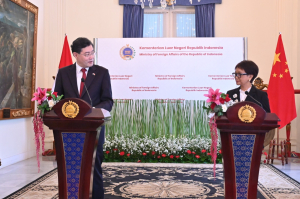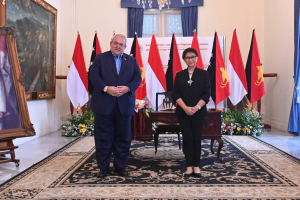Political cyberattacks loom ahead of 2024 elections
As Indonesia approaches the 2024 General Elections and competes for the support of tech-savvy voters, digital freedom of expression is expected to suffer further, according to a recent study by the Southeast Asia Freedom of Expression Network (SAFEnet).
The study predicts a rise in cyberattacks targeted towards individuals or groups expressing dissenting views, particularly critical voices.
The number of digital attacks has increased significantly over the past two years. Specifically, there were 147 separate instances of digital attacks in 2020, which increased to 302 in 2021, solidifying a trend that had been growing since the beginning of President Joko "Jokowi" Widodo's second term.
The attacks were aimed at a minimum of 130 individuals, mostly activists, students and journalists who had voiced criticism towards the government.
Increasing cyberattacks
Fortinet Senior Director of Regional Sales for Southeast Asia and Hong Kong Peerapong Jongvibool stated Indonesia encountered numerous cyberattacks per day during the fourth quarter of 2022.
"In Q4 2022, Indonesia became a country with quite a lot of cyber attacks that have occurred to date, namely 1.65 million per day. However, in Q1 [in 2023] I am pretty sure the number will be even higher so no one can provide that [security]," he explained Pete in Jakarta on February 14, 2023, as reported by Antara news agency.
The National Cyber and Encryption Agency (BSSN) reported that the total number of cyberattacks in 2022 reached 976,429,996 and the majority of the traffic irregularities were due to malware activities.
The unknown culprit(s)
Although the identity of the attackers is mostly unknown, SAFEnet's secretary Anton Muhadjir stated that the cyberattacks were politically motivated, as evident from the victims' backgrounds. It is anticipated that these attacks will escalate as the voting day approaches.
“We believe that [digital attacks] will increase, just by looking at the data of the past three years. Digital attacks tend to increase when there are moments of political significance,” Muhadjir said, as quoted by The Jakarta Post.
He forecast that cyberattacks for the 2024 elections would be by hacking of social media accounts and electronic devices will continue to be the most prevalent forms of attack, followed by doxing. Additionally, he noted that politically motivated attacks targeting opponents or their followers are also highly probable.
Cyberattacks crackdown in progress
BSSN announced in late February 2023 in its statement on a news site affiliated with the National Police, that they would be taking action to minimize the potential rise in cyberattacks before the 2024 elections.
Minister of Communication and Information Johnny G. Plate has established a special team called the Computer Security Incident Response Team (CSIRT) to help the General Elections Commission (KPU) in preparing for potential cyber attacks and hoaxes, the ministry said in its website. The team will be active around the clock and will monitor all digital platforms.
"Regarding cyber attacks, there has been coordination across ministries and institutions to have a Cyber Security Incident Response Team (CSIRT). This team will respond to all cyber attacks," Plate said on July 6, 2022, as quoted by Kumparan.com.
They also collaborate with several platform providers to combat cyber attacks and enhance their systems with advanced technologies to prevent unauthorized access.
The Coalition for Democratization and Moderation of Indonesia's Digital Space (Damai) is urging the government and digital platforms, including social media, to implement digital content moderation that is sensitive to local norms and respects international human rights and freedom of expression standards, ECPAT reported in its website.
This initiative is crucial in combating the spread of disinformation and hate speech in the digital realm, particularly in light of the 2024 elections.
Protecting 2024 elections from cyber threats
As the elections approach, cybercriminals have a chance to customize their attack methods based on political campaigns, platforms and candidates' and voters' behaviors.
There are two main types of attacks that could impact this period, including:
- Traditional cybercrime, which aims to gain financially by using stolen data
- Cyber hacktivism, which focuses on persuading or dissuading political groups or messages by disrupting them
To ensure a secure digital election, the government can implement various solutions and recommendations to minimize cybersecurity risks, The Jakarta Post reported. Some of these measures include:
- Enhancing response time through the utilization of analytics and automation
- Implementing the Zero Trust Network Access (ZTNA) 2.0 policy to safeguard networks that contain critical infrastructure
- Securing critical endpoints from potential cyber threats.
Already have an account? Sign In
-
Start reading
Freemium
-
Monthly Subscription
20% OFF$29.75
$37.19/MonthCancel anytime
This offer is open to all new subscribers!
Subscribe now -
Yearly Subscription
33% OFF$228.13
$340.5/YearCancel anytime
This offer is open to all new subscribers!
Subscribe now







